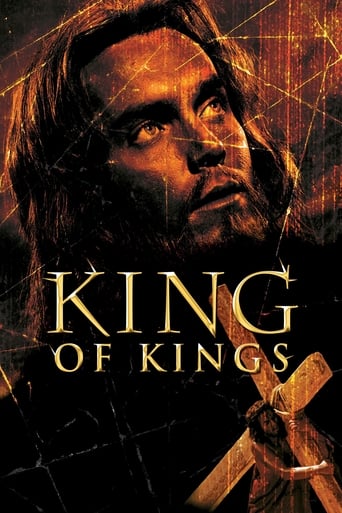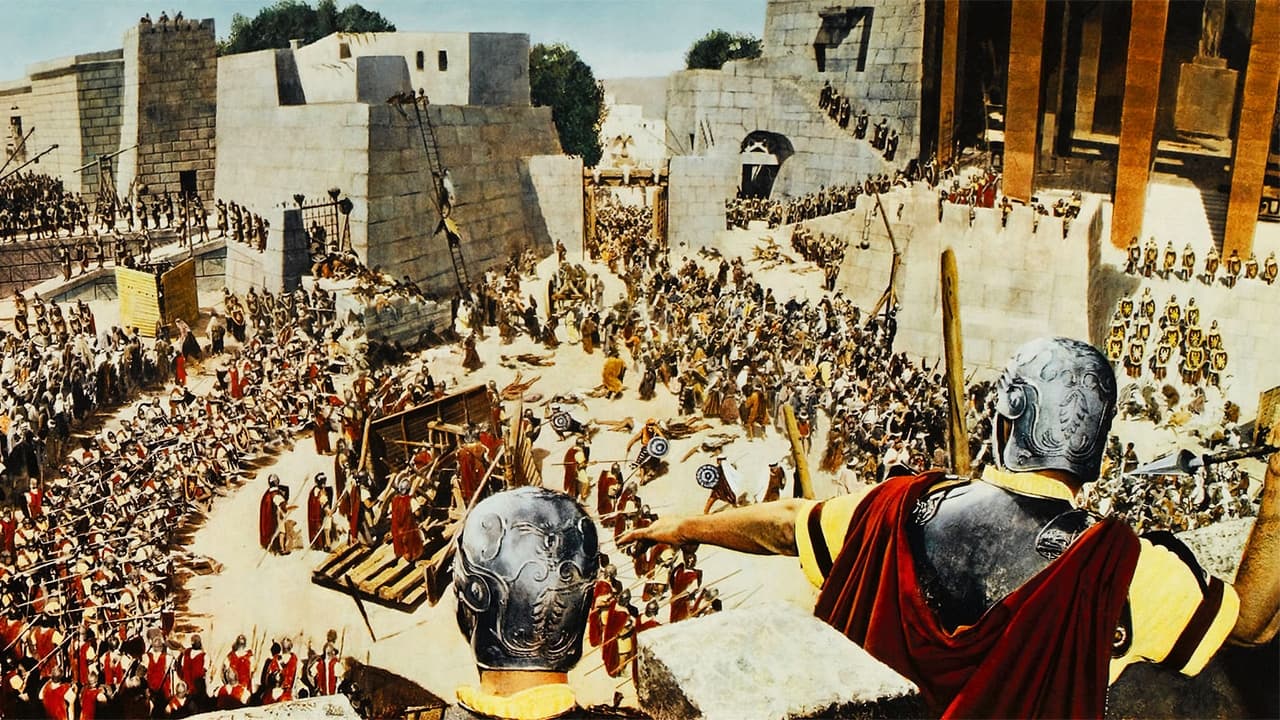JohnHowardReid
Where's Lazarus? No Lazarus! These guys Bronston, Yordan and Ray certainly bear watching. Anyone capable of producing a life of Christ without Lazarus is just as likely to come up with a Nixon minus Watergate or Roosevelt without the New Deal or a Truman bereft of the atom bomb. And where's Peter, the big fisherman, the rock on whom the Christ was to build His church? Is that him milling around in the background somewhere? What are these guys doing with their 165 minutes? Pasolini managed to film a whole gospel in 142. Yet here we have 165 with no Lazarus, no woman at the well, no prodigal son, no good Samaritan, no wedding feast at Cana, no bed-ridden man lowered from the roof, no pigs running berserk, no storm at sea, no feeding of any multitudes, no expulsion of the money-changers out of the temple, no Pharisee and publican praying in the temple, no healings on the Sabbath day, no gnashing of teeth in the synagogue, no lepers made clean, no woman with internal bleeding touching his cloak, no rejection by the Nazarenes, no entrapping questions from the religious bigots. Other noes are too numerous to list. Above all though, no insistence on belief in Jesus as necessary for automatic entry into Paradise. Instead we get fantasy stuff like Jesus running about an artful mountainside spouting strings of collected sayings or visiting the Baptist in his prison cell; and a whole lot of absolute tosh about Barabbas, a minor if notorious robber who is imaginatively transformed from thief to patriot and often thrust center-stage and involved in a great deal of wholly fictitious xenophobic words and bloody if zealous deeds. There is so little here of the real Christ and so enormously much of the scriptwriter's misplaced imagination that only the merest shell of the messiah's life is presented: his birth, John the Baptist, the 40 days in the desert, the twelve apostles (particularly including Judas), his entry into Jerusalem, the last supper, his trial before Pilate, his crucifixion between two thieves, his burial and resurrection. Yordan's cut-to-the-bone, threadbare outline is bad enough. What is worse though is that he makes no apology for or distinction between what is gospel and what is purely Yordan. Anyone unfamiliar with or even just vague about the details in the gospel accounts could be pardoned for coming away from "The King of Kings" with a whole raft of deliberate distortions and out-and-out falsifications firmly embedded in their mind. P.S. Regarding the three cinematographers, Planer suffered a heat stroke halfway through and was replaced by Krasner, whilst Berenguer worked with the second unit.
chitown_babe
Before other movies depicting the life of Christ, this was always my favorite. In my opinion, the best depiction of Christ's life was and still is the made for TV series, "Jesus of Nazareth". Robert Powell was a little "soap opera-ish" but overall he did a good job. There are many biblical errors in this version--mostly stressing the Protestant version of the Bible, but again, those were easily ignored. I thought the Magi were the BEST ever--especially Donald Pleasance. James Earl Jones wasn't bad either. Fernando Ray (Rey?) was also great! Today, my favorite religious movie is "The Passion of the Christ". There is no other biblical movie to date that can outdo this perfect depiction of the last three days of Jesus' life. Mel Gibson has his problems, but this movie is his shining accomplishment. (Apocalyto was awesome, too!)
ladyborg
IMDb needs a negative star rating for something this bad!!!!! I am giving it 1 star because that is the minimum for IMDb, it deserves a -19! Hardly a single scene is Biblically accurate! Don't waste your time!!!!!!! A 'good' scene is one of the few in which several actual Biblical things were combined into one, such as the sermon on the Mount of Olives, most everything else is ENTIRELY made up!There are tons of made-up scenes, events and people in this movie. If you care about accuracy in your movies, you have come to the wroooooong flick. I have heard of taking artistic license in movie-making, but it's hard to believe such a big budget movie could have been made so badly! And they already had the Scriptures as the 'script'!
chaos-rampant
I read a highly amusing bit in the trivia section that I want to share here - apparently the crucifixion had to be reshot because preview audiences reported back offended by a hairy chest. So let this be a revealing irony behind so many whitewashed historic spectacles; movies so often print images that we want to see.But since there is clearly not enough spectacle in this legend, unlike so many Biblical epics as DeMille defined the genre, so loose scripture that pivots around big splashy entertainment on nothing short of a monumental scale, nothing short of waters parting and a temple being toppled, since in its essence, this is a story of humble origins and deep emotion, so Barabbas becomes the hardened guerilla fighter who leads Judean rebels against Roman oppressors.There are two battle scenes here, both ill-advised and distracting. The rest is a common Hollywood Jesus narrative, emphasis on the piercing gaze of virtue and the rod of suffering as the tree of life, blame once more shifted to Romans and the Herods - stressed to be of Arab descent.It doesn't work - it is clunky, feels patched together, formulaic filler when it steers away from the tragic scene. But this reveals something else, let's call it the Italian connection.Now Hollywood at around this time, certainly after the monumental success of Ben Hur, was busy filming casts of thousands in Italy outside Rome, North Africa, Spain and the Almerian desert. The Italians had inspired this tradition as far back as the silent era, and the original Ben Hur had also filmed there, but now all these huge American productions were rolling in, well equipped, professional, helmed by directors of note, and young Italian filmmakers could not hope for a better film school. Many tutored there, including Leone.Why I deem this important to mention, is because this type of film is where the new cinematic language for action films was being forged that would last until a few years ago and is still in the process of being replaced now by the Orson Welles eye.Nicholas Ray was not the man for this project, which I assume was tighly supervised by MGM hoping for another cash cow, and he only gets to bring his colors - those ruby reds and deep cyans, they might as well have spilled over from the cavernous sets of Johnny Guitar. But just look at the kind of filmmaking going on in a few key instances, say the exchange of very tight close-ups of eyes when the Baptist meets Jesus by the river, or the amazing series of operatic panels for the crucifixion, really the only scene worth watching here.They look jumbled and out of their proper order, as though the rest of the film was filmed by clerks. It is going to be breath-taking when Leone unfolds them from the scrunched bunch of celluloid and are made to stretch across rolls of punctuated silence. The catch is that his operas were about scoundrels, but they resonated with something akin to spiritual clarity.So Ray, a filmmaker to watch on a good day, doesn't get it right here, but mostly I believe because spectacle was imposed on him and he only applied colors, not really fussing over arrangements except in the finale. And this particular story can only resonate in its true beauty when the son of God teaches with a dust-caked mouth and bleeds ascetically, and the air is not all musky and baroque but smells of earthly scents.Orson Welles narrates this and is unusually restrained. He had appeared in one of those Biblical epics in Italy a few years back, directing his own scenes for what must have been a tremendous seminar for everyone in attendance. He would appear the next year as a director making a Biblical film in Italy, in a film by the one man who got this story right, an Italian.



 AD
AD



